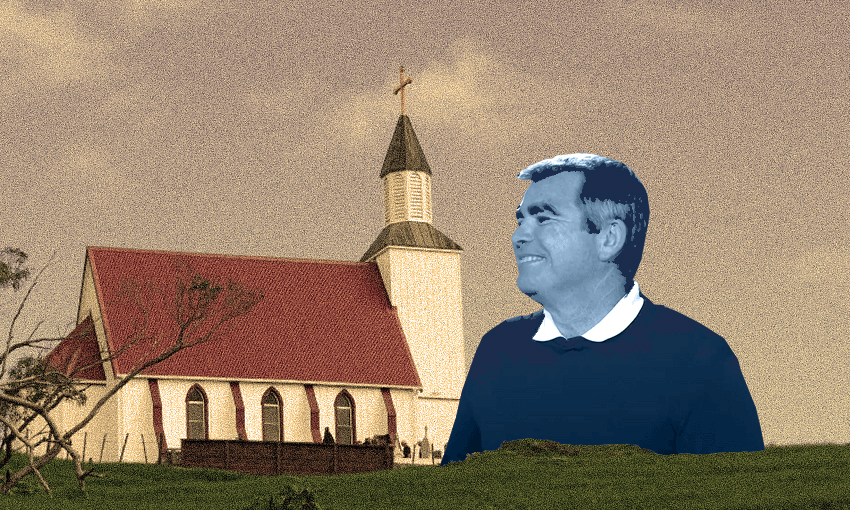Family First has been on tour over the election campaign, pounding out the message that voters should say no on both referendums. Alex Braae caught up with its leadership in Gore.
I’ve long been fascinated and mystified in equal parts by Family First. At a time when it often looks like the march of social progress is unstoppable, they’ve thrived as an organisation by standing firm against change.
In the most basic sense, Family First’s success is built off being phenomenal networkers and campaigners. They aren’t politicians in the strict sense, but they participate in politics in a way other advocacy groups can only dream of. It’s not a stretch to say that director Bob McCoskrie is much more politically influential than the average backbench MP.
The group also boasts a genuinely nationwide presence, and could fill a room in pretty much any town in New Zealand. As if to underline that point, Family First has been on tour over the last few months, with something like 37 dates in total. It can get a crowd in Paeroa, Kerikeri or Rangiora, along with stops in the major cities. Almost none of the tour has got mainstream media attention, but the group doesn’t really need it. It’s got its own channels.
The point of me driving a Jucy van around the country to cover the election is to go and meet people on their home turf, so I went the long way around to Gore to see McCoskrie and Nick Tuitasi, a former police veteran who is Family First’s Pacific director. The Tuesday night meeting is held in the Baptist church in a precinct of the Southland town packed with churches. It’s a large room, but it feels full.
Family First’s tour isn’t to tell people which parties to vote for, although the organisation does give a strong steer in the form of publishing the collected voting records of every MP on a selection of issues, such as abortion or prostitution law reform. Rather, it’s about campaigning specifically on the two referendum questions. Under the banner of “Know means No”, it’s billed as a chance to hear why the only safe option is to vote against both the Cannabis Legalisation and Control Bill, and the End of Life Choice Act. Around 400,000 such pamphlets have been published, and are currently being distributed all over the country.
McCoskrie doesn’t like the names of those pieces of legislation, by the way. He sees the inclusion of the words “control” and “choice” as being “smoke and mirrors”, obscuring what the results of the referendums winning would actually be.
The format of the meeting is straightforward. The local pastor opens with a prayer, before Tuitasi gets up to introduce himself and the first topic. He plays more of a supporting role to McCoskrie, who does the meatier information sections built heavily from international data. Before both topics, there’s a high-production-value video that puts a sympathetic human face to the issue. At the end of it all, there’s a brief Q&A, followed by the most important part, according to Tuitasi – a cup of tea and a chat. It’s said as a joke, but he probably isn’t wrong in the importance of that final bit in building up campaign energy and connections.
McCoskrie’s first point in his speech on euthanasia is around reframing the idea of choice. He points out that choice already exists in the form of do not resuscitate orders, and the ability to refuse treatment, or turn off life support. It doesn’t quite address the central point of the pro-EOLC campaigners thought – that under the law, it’s only available for those who are facing death that’s imminent, unavoidable and painful.
But it set up what followed – a ruthless display of message discipline that hammers both the bill, and the wider concept of euthanasia, from every conceivable angle. The pro side is mentioned only to bring up particularly ghoulish soundbites from advocates, like the British neurosurgeon Henry Marsh who said in a Sunday Times interview that “even if a few grannies get bullied into it, isn’t that the price worth praying for all the people who could die with dignity?” That line has become an international rallying point for opponents of euthanasia, because of how offensive it is to those who believe in the sanctity of life, and because it’s an open admission that coercion of the elderly and disabled could happen.
Cannabis legalisation would get the exact same treatment. McCoskrie speaks without notes, and only barely glances back at the PowerPoint giving the top line points. But he never loses his place in the script. Each point is made with a short, snappy sentence, an elaboration, and then an example or piece of evidence to back it up. It’s textbook stuff: clear and concise.
It also quickly becomes clear that the target audience isn’t necessarily in the room – by the soft murmurs of approval that accompanies many points, they’re all already on the same page. Rather, the meeting is about arming them with the arguments they can then take out into their communities to convince others. Often, particular ideas are raised as if an opponent has just made a point, with the audience then being talked through how McCoskrie or Tuitasi would respond. Dozens of supporters are being turned into advocates.
They know exactly who they’re talking to. McCoskrie mentions the underfunding dramas of the nearby Lumsden Maternity Centre to argue that the health system wouldn’t be able to handle additional euthanasia. Tuitasi tells a story about permissive alcohol law reform that pitched people in the regions against the bureaucrats and lobbyists in Wellington, to make the point that if the cannabis law passed, the people in the room wouldn’t be heard on any changes.
It’s masterful politics, in the sense of understanding the long, hard grind of campaigning. If Family First is going to win its battles against the referendums, it’ll need to do it conversation-by-conversation, reframing the arguments each time so they take place on the most favourable ground. It’s difficult to see the same clarity of messaging and relentlessness on the yes side of either issue. Even though David Seymour and Chlöe Swarbrick have worked hard, there isn’t necessarily the same unified and motivated wider network for them to mobilise.
While most polling currently has the euthanasia referendum set to win comfortably, there’s still a bit of time for minds to be changed, particularly if voter turnout favours the socially conservative. On cannabis, it seems clear that the Say Nope to Dope campaign has out-worked and out-messaged pro-legalisation campaigners, with the balance of polling starting to seriously shift. The old sporting analogy about one team “just wanting it more” occurs to me a lot during the presentation – Family First knows how to win.
There’s also a bit of revelling in putting out marketing that – to use the tasteless phrase – triggers the libs. The now-infamous “Kia-Ora Dopey” dairy ad is waved around, which uses classic Tip-Top style branding with a cannabis-infused twist. It’s meant to symbolise the proliferation of cannabis shops if the law passes. Pro-legalisation campaigners have said extremely loudly that it creates a misleading impression of what the regime would actually look like. McCoskrie has a chuckle.
But what does Family First actually want? It’s clear there’s no point debating it on any specific point of the legislation – it’d have an answer ready to go that had already come up in the talk. But for most of Family First’s existence, it’s campaigned on stopping things. I want to ask for its views on compromise positions like decriminalisation, and the logistics of such a hearty campaign. But mostly, I want to ask if it has a positive vision for the country, or if its whole political project is just built around stopping the visions of people it disagrees with.
Unfortunately, my long list of questions is unnecessary. The interview is brief, involving just one question – and I don’t even get to ask it.
When I approach the pair after their talk and identify myself as a journalist, McCoskrie says we should do the interview immediately. Brilliant, I say. And when he asks which publication I’m with, I say The Spinoff.
His demeanour changes immediately, throwing up a hand as he scowls. “Forget it,” he says. “I wouldn’t touch The Spinoff in a month of Sundays. Dishonest publication.” Immediately, he walks away.
And so I wander out into the Gore night, along the road lined with churches. Part of me is annoyed at the ease by which McCoskrie decides there’s no value to him in talking to me. But more than that, I marvel at being able to see up close a machine that’s been so influential in shaping and driving conservative politics in New Zealand. I wonder if the forces of social liberalism really understand what they’re up against.
Alex Braae’s travel to Gore was made possible thanks to the support of Jucy, who have given him a Cabana van to use for the election campaign, and Z Energy, who gifted him a full tank of gas via Sharetank.





